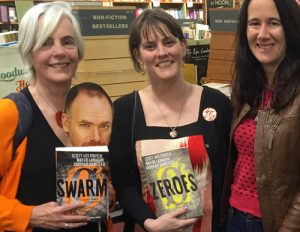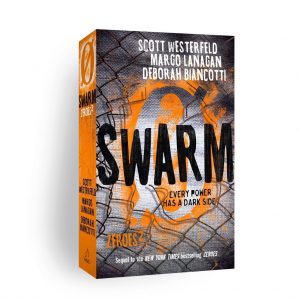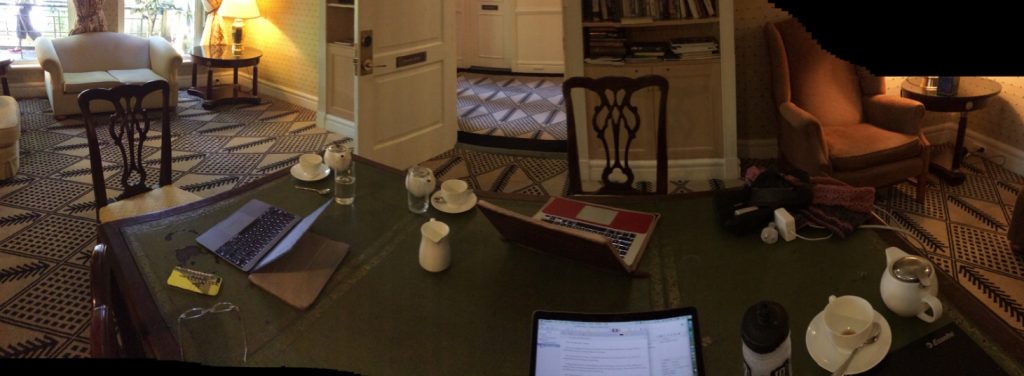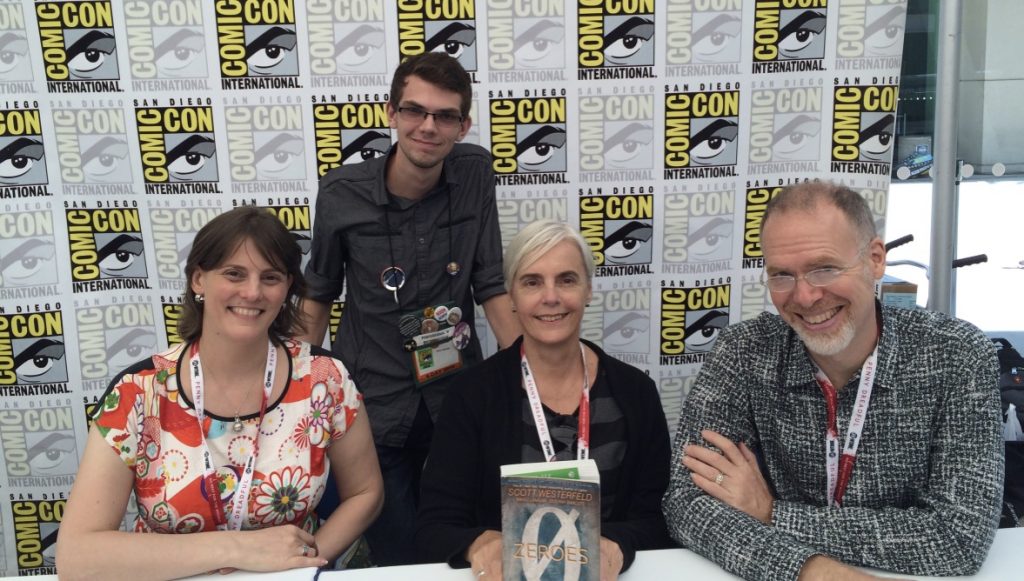 As many of you know, I recently co-wrote a book with nine(!) authors (“Into Tordon” by Z.F. Kingbolt), so am particularly fascinated by collaborative writing at the moment. A few weeks ago I attended the launch of “Swarm“, the second in the superhero YA series by Margo Lanagan, Deborah Biancotti and Scott Westerfeld. Every power has a price! I loved the first in the series, “Zeroes“, and can’t wait to get stuck into “Swarm“. They’re both New York Times bestsellers. Wow!
As many of you know, I recently co-wrote a book with nine(!) authors (“Into Tordon” by Z.F. Kingbolt), so am particularly fascinated by collaborative writing at the moment. A few weeks ago I attended the launch of “Swarm“, the second in the superhero YA series by Margo Lanagan, Deborah Biancotti and Scott Westerfeld. Every power has a price! I loved the first in the series, “Zeroes“, and can’t wait to get stuck into “Swarm“. They’re both New York Times bestsellers. Wow!
So how did Margo, Deborah and Scott go about collaborating over the writing of their awesome books? To find out, I asked Margo and Deborah…
At your Sydney launch of ‘Swarm’, you mentioned working well as a team, with most decisions being made equally between the three of you. You also had a glorious leader, however, and where a single person needed to make a call that person made it. Did you all agree that was how things were going be before you started writing, or did your working relationship evolve into that system, and were there any hurdles with that?
Deb: Did we say we worked well? That might’ve been dramatic license. 😉 Through trial and error, we discovered that what works best for our team is if we get together for an intensive planning phase (say, 3-4 days) where we can immerse ourselves in the story without distraction. Then once we’re all clear on what we need from our chapters, we go away to write them. We also borrowed a model from TV writing: we have a showrunner (Scott) who has final call on the manuscript. This model helps to protect the vision for the project, and ensures we don’t end up in a situation like ‘death by committee’ (i.e. where too much compromise and too many voices can strip a work of its originality).
 Margo: Yes, the showrunner/deciding vote thing was established by the time Deb and Scott invited me to join them. I have to say, it’s a relief to have some of the curlier decisions taken out of my hands—yes, even if I’ve strenuously argued for the losing case. For example, I rewrote the ending of Swarm to make some kind of point there, but Scott wasn’t convinced, so I just had to let that one go. I’m keeping my brooding resentment under control, though–so far. It may all go to shit in book 3, who knows?
Margo: Yes, the showrunner/deciding vote thing was established by the time Deb and Scott invited me to join them. I have to say, it’s a relief to have some of the curlier decisions taken out of my hands—yes, even if I’ve strenuously argued for the losing case. For example, I rewrote the ending of Swarm to make some kind of point there, but Scott wasn’t convinced, so I just had to let that one go. I’m keeping my brooding resentment under control, though–so far. It may all go to shit in book 3, who knows?
With our collaborative writing, it’s my job to ensure our stories have a consistent voice and tone. At the ‘Swarm’ launch you mentioned that you all edited each others’ writing as you went. Did one person ever do a ‘voice’ or ‘tone’ edit, or do you all write similarly such that a consistent voice and/or tone came naturally, and were there any hurdles with that?
Deb: Our showrunner does have the right to do a final voice/tone edit. My perception is that the longer we work together, the easier it is for us to hit that shared voice. But I’d still want someone to do a consistency edit at the end.
Margo: Oh, Scott keeps our individual oddities (well, my individual oddities) of style under control by littering my first drafts with “WTF?” and “Who talks like this?” The writing of book 1 was an extended lesson in carving back prose to keep things moving, and bigging up incidents for maximum drama and consequence. My first drafts still tend to be pretty flat—Scott’s first-round comments can be heavy on the caps lock “EMBIGGENATE—this should BLOW HIS MIND!”, that kind of thing.
How did you cope emotionally with working collaboratively, where all egos and ideas must remain subservient to ‘the story’? Did it help to have ownership of two characters each?
Deb: It did help to have characters we could root for. It meant that we could make some of the big character arc decisions ourselves, and champion our characters when they sadly had to end up in other people’s chapters doing stuff we didn’t want them to do. 😉 But there were still times where the story had to prevail. I occasionally found myself writing a chapter and wondering why in hell my character would ever do that thing. And then having to brainstorm motivations for my character’s behaviour after the fact. Which could be daunting.
Margo: Cried a lot. Nah, just joking. In fact it was a relief to have the story, and other people’s contributions to it, putting boundaries around my own chapters. I’ve found solo writing, where I get to make all the choices, quite difficult since the collaboration started—too many possibilities! No instant snarky feedback to direct me! 😀 Having two characters to wrangle is good—we each have our own little fiefdom within the larger, show-run Zeroes republic, so we can keep some control, in the ways Deb says.
Which was the hardest part of the project for you – conceptual, writing, editing, production or marketing – and why?
Deb: The hardest part for me was working to other people’s timelines and processes. There were times when I was waiting around, and times when I had to rapidly re-engage. And then there were times when people were waiting on me. The idea of being able to work at my own pace the whole way through a project has become pretty enticing.

One of their collaboration tables, at the civilised cups-of-tea stage
Margo: Yes, the rapid re-engagement thing could be alarming. But as I’ve probably implied above, the first draft is the hardest part for me. I can’t seem to get a chapter’s motor really running until second draft (but it was even later for book 1, so I’m getting better). Conceptual is just all fun—we sit around a table throwing ideas at each other, and some die a quick death and others get us all wide-eyed and excited, and a dead idea sometimes suddenly jumps back to life and becomes exactly the right thing!
Writing and editing is the usual combination of total absorption, grind, confusion and “Aha!” inspiration. But as I said, it’s not possible to get as lost within the collaborative framework as it is with a solo work.
Production is a doddle—the manuscripts are pretty clean, so copy-editing’s not a big deal, and the rest is cover proofs flashing around, bit of blurb writing, easy-peasy.
Marketing—well, Scott has just been touring for Swarm in the US, so the main load of marketing this second book has fallen on him. For book 1 Deb and I toured too, as well as doing the ALA conference and San Diego Comic-Con. That opened my eyes. I hear about bestselling authors like Karen Joy Fowler travelling to promote their books for two years, and I am in horrified awe. But this time around it’s been more a matter of online and podcast and radio interviews, less talking off the cuff on a stage or in a bookshop. Best thing about touring a collaborative series? There’s always someone to share the stage with—unless you’re Scott, of course. But he’s a superstar; he can do that stuff standing on his head.

The collaborators, with the chair of their San Diego Comic-Con panel, David Mariotte.
What would be your biggest tip for anyone thinking of writing collaboratively?
Deb: I’m torn between offering a flat out: Do it! Or a more salutary: know thyself. If you know that you treasure your unique voice or your special narrative skills, maybe collaboration really isn’t for you, and that’s okay. But if you’re curious about writing, willing to learn, determined to meet a goal, able to communicate early and often, in possession of a robust sense of humour (you’re going to need it . . . ) and interested in being part of something—a team—that’s greater than the sum of its parts, then, hell. Try it out. You just might love it.
Margo: Deb’s is really good advice! My top tip would be to agree on ground rules before you start. My second-top tip would be to be flexible and open to all advice, however delivered, at any stage of the game.
How do you manage to present such a united front when talking about ‘Zeroes’ and ‘Swarm’ to the reading public? Have you all agreed on what’s best to say or not say, such as protecting spoilers and being respectful of your fellow co-authors?
Deb: Yes, we agreed on all the big points back when we started promoting book 1.
Margo: We did. Also, spending all that time with each other, both writing the books and promoting them—I mean, sometimes we were telling the Zeroes-collaboration origin story four times a day—we’ve literally got our act together. Nowadays we just know what to keep under our hats and the different angles we can take on what can be said. Also, what’s likely to get the best laughs. That’s important. Laughs are very, very important at all stages of the collaborative process. Maybe that’s my top tip.
Thank you so much Deborah and Margo! “Zeroes” and “Swarm” are available from all good bookstores, like here and here, right now! Here’s the blurb for “Zeroes”:
Six unique superheroes, one bag of stolen drug money, one bungled bank robbery and a whole heap of trouble. Ethan aka Scam has a voice inside him that’ll say whatever people want to hear, whether it’s true or not. Which is handy, except when it isn’t – like when the voice starts gabbing in the middle of a bank robbery. The only people who can help are the other Zeroes, who aren’t exactly best friends these days. Enter Nate, aka Bellwether, the group’s ‘glorious leader.’ After Scam’s SOS, he pulls the scattered Zeroes back together. But when the rescue blows up in their faces, the Zeroes find themselves propelled into whirlwind encounters with ever more dangerous criminals. At the heart of the chaos they find Kelsie, who can take a crowd in the palm of her hand and tame it or let it loose as she pleases.
If you like YA and superheroes, give the series a go, you’ll be glad you did!
Interested in what other authors have to say about collaborative writing? I’ve also interviewed Alan Baxter and David Wood, and the ‘Alice Campion’ authors, Jenny Crocker, Jane Richards, Jane St Vincent Welch and Denise Tart. Click to read those interviews!





